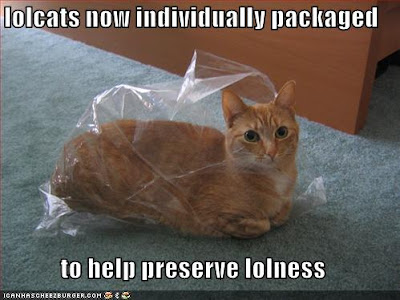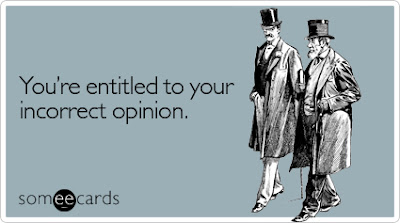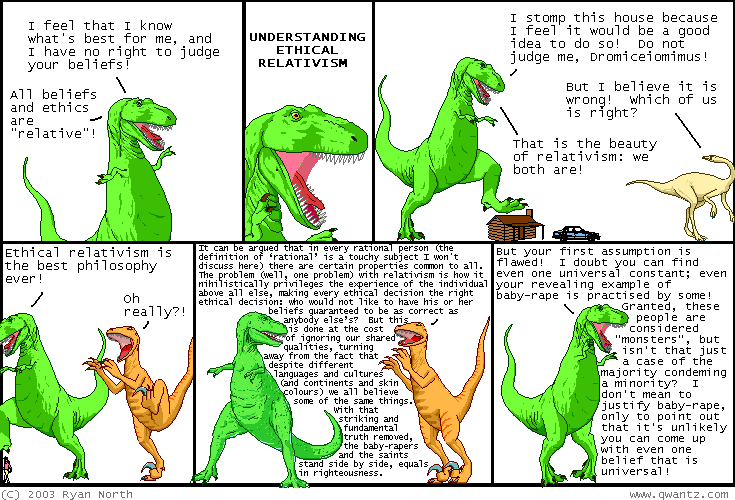One of the trickier concepts to understand in this course is the
structure (or
support) of an argument. This is a more detailed explanation of
the term (it's the same as the handout). If you've been struggling
to understand this term, the following might help you.
An argument's structure is its underlying logic; the way the premises
and conclusion logically relate to one another. The structure of an
argument is entirely separate from the actual meaning of the
premises. For instance, the following three arguments, even though
they're talking about different things, have the
exact same structure:
1) All tigers have stripes.
Tony is a tiger.
Tony has stripes.
2) All humans have wings.
Sean is a human.
Sean has wings.
3) All blurgles have glorps.
Xerxon is a blurgle.
Xerxon has glorps.
There are, of course, other, non-structural differences in these three
arguments. For instance, the tiger argument is overall good, since
it has a good structure AND true premises. The human/wings
argument is overall bad, since it has a false premise. And the
blurgles argument is just crazy, since it uses made up words.
Still, all three arguments have the same underlying structure (a
good structure):
All A's have B's.
x is an A.
x has B's.
Evaluating the structure of an argument is tricky. Here's the main idea regarding what counts as a good structure:
the premises provide us with enough information for us to figure out the conclusion from them. In other words, the premises,
if they were true, would logically show us that the conclusion is true. So,
if you believed the premises, they would convince you that the conclusion is worth believing, too.
Note I did NOT say that the premises are
actually true
in a good-structured argument. Structure is only about
truth-preservation, not about whether the premises are actually true or
false. What's "truth preservation" mean? Well, truth-preserving
arguments are those whose structures are such that if you stick in
true premises, you get a true conclusion.
The premises you've actually stuck into this particular structure
could be good (true) or bad (false). That's what makes evaluating an
arg's structure so weird. To check the structure,
you have to ignore what you actually know about the premises being true or false.
Good Structured Arguments
If we assume that all the premises are true, then the conclusion will
also be true for an argument to have a good structure. Notice we
are only
assuming truth,
not guaranteeing it. Again, this makes sense, because we’re
truth-preservers: if the premises are true, the conclusion that follows
will be true.
EXAMPLES:
1) All humans are mammals.
All mammals have hair.
All humans have hair.
2) If it snows, then it’s below 32 degrees.
It is snowing right now.
It’s below 32 degrees right now.
3) All humans are mammals.
All mammals have wings.
All humans have wings.
4) Either Yao is tall or Spud is tall.
Yao is not tall.
Therefore, Spud is tall.
Even though arguments 3 and 4 are ultimately bad, they still have good
structure (their underlying form is good). The second premise of
argument 3 is false—not all mammals have wings—but it has the same
exact structure of argument 1—a good structure. Same with argument
4: the second premise is false (Yao Ming is about 7 feet tall), but
the structure is good (it’s either this or that; it’s not this;
therefore, it’s that).
To evaluate the structure, then, assume that all the premises are
true. Imagine a world in which all the premises are true. In that
world, are you able to figure out from the premises that the
conclusion is also true? Or can you imagine a scenario in that world in
which the premises are true, but the conclusion is still false? If
you can imagine this situation, then the argument's structure is
bad. If you cannot, then the argument is truth-preserving
(inputting truths gives you a true output), and thus the structure
is good.
Bad Structured Arguments
In an argument with a bad structure, you can’t draw the conclusion
from the premises – the premises don’t give you enough information.
Bad structured arguments do not preserve truth.
EXAMPLES:
1) All humans are mammals.
All whales are mammals.
All humans are whales.
2) If it snows, then it’s below 32 degrees.
It doesn’t snow.
It’s not below 32 degrees.
3) All humans are mammals.
All students in our class are mammals.
All students in our class are humans.
4) Either Yao is tall or Spud is short.
Yao is tall.
Spud is short.
Even though arguments 3 and 4 have all true premises and a true
conclusion, they are still have a bad structure, because their form is
bad. Argument 3 has the same exact structure as argument 1—a bad
structure (it doesn’t preserve truth).
Even though in the real world the premises and conclusion of argument 3
are true, we can imagine a world in which all the premises of
argument 3 are true, yet the conclusion is false. For instance,
imagine that our school starts letting dogs take classes. The second
premise would still be true, but the conclusion would then be false.
The same goes for argument 4: even though Spud is short (Spud Webb is
around 5 feet tall), this argument doesn’t guarantee this. The
structure is bad (it’s either this or that; it’s this; therefore, it’s
that, too.). We can imagine a world in which Yao is tall, the
first premise is true, and yet Spud is tall, too.





 9) All hornets are wasps.
9) All hornets are wasps.


 Kit Fine
Kit Fine Sally Haslanger (only available in
Sally Haslanger (only available in 


